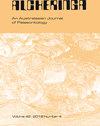寒武纪三叶虫Hsuaspis的异时性
IF 1.5
4区 地球科学
Q3 PALEONTOLOGY
引用次数: 7
摘要
个体发育比较表明,中寒武纪Xystridura是由下寒武纪Hsuaspis bilobata在个体发育过程中通过性状发育的速率或时间的变化而进化而来的。幼体生长期的延长,延迟成熟,或过度发育,导致正常缓慢的早期全髓鞘生长模式在快速的晚期原髓鞘生长阶段被夸大,产生了木藻的眉间明显的增生。来自新南威尔士州早寒武纪上部Cymbric Vale组的H. cerastes的形态似乎表明了这种嗜热趋势的开始。本文章由计算机程序翻译,如有差异,请以英文原文为准。
Heterochrony in the Cambrian trilobite Hsuaspis
Comparison of ontogenetics suggest that the Middle Cambrian Xystridura evolved from the Lower Cambrian species Hsuaspis bilobata by changes in the rate or timing of development of characters during ontogeny. Extension of the juvenile growth period delayed maturation, or hypermorphosis resulted in exaggeration of normally slow, early holaspid growth patterns within the rapid, late meraspid growth stage, producing a marked progradation of the glabella in Xystridura. Forms referable to H. cerastes from the upper Early Cambrian Cymbric Vale Formation of New South Wales appear to show the beginnings of this hypermophic trend.
求助全文
通过发布文献求助,成功后即可免费获取论文全文。
去求助
来源期刊

Alcheringa
地学-古生物学
CiteScore
2.60
自引率
7.70%
发文量
28
审稿时长
>12 weeks
期刊介绍:
Alcheringa : An Australasian Journal of Palaeontology is the official journal of the Australasian Palaeontologists.
Alcheringa covers all aspects of palaeontology and its ramifications into the earth and biological sciences, including:
Taxonomy-
Biostratigraphy-
Micropalaeontology-
Vertebrate palaeontology-
Palaeobotany-
Palynology-
Palaeobiology-
Palaeoanatomy-
Palaeoecology-
Biostratinomy-
Biogeography-
Chronobiology-
Biogeochemistry-
Palichnology.
Review articles are welcome, and may be solicited from time to time. Thematic issues are also possible. Emphasis is placed on high quality and informative illustration, in both line drawings and photographs. Papers of general significance may receive preference over those of more local interest.
 求助内容:
求助内容: 应助结果提醒方式:
应助结果提醒方式:


